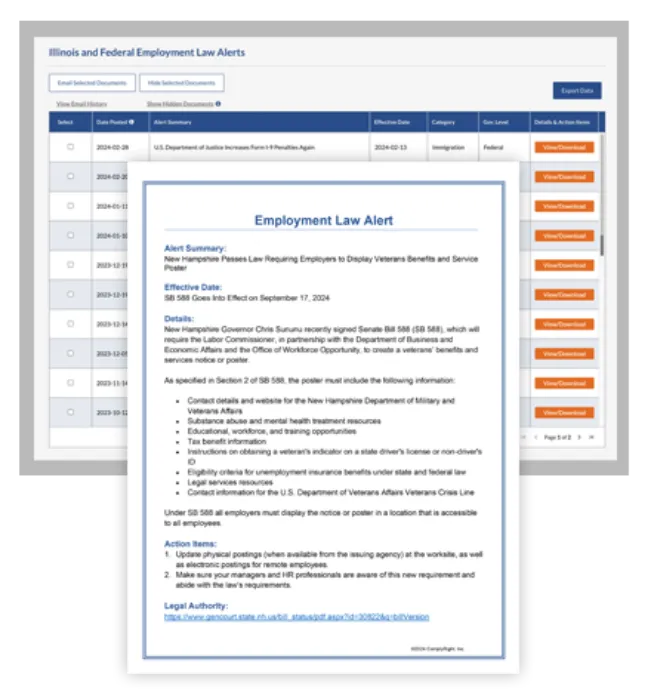The demand for fair, competitive pay is ever-present for employers. And today, expanding wage transparency laws are giving job candidates and current employees a distinct advantage.
Depending on the states and cities in which your business operates, you may be legally required to disclose salary information under new wage transparency laws. Learn why these laws are growing and how to uphold them in your hiring and promotion practices.
What States Have Wage Transparency Laws?
As of February 2025, 13 states require employers to share pay ranges under certain circumstances:
- California
- Colorado
- Connecticut
- Hawaii
- Illinois
- Maryland
- Massachusetts
- Minnesota
- Nevada
- New York
- Rhode Island
- Washington
- Washington, D.C.
Similar legislation becomes effective in New Jersey on June 1, 2025, and in Vermont on July 1, 2025.
Several cities have adopted wage transparency laws, as well, including:
- Cincinnati, Ohio
- Columbus, Ohio
- Jersey City, New Jersey
- Ithaca, New York
- New York, New York
- Toledo, Ohio
- Westchester County, New York
Generally speaking, wage transparency laws impact a business externally through advertised job postings and internally through promotions and transfers. Some locations also require disclosures about benefits offerings and other types of compensation, such as bonuses and commissions. The law’s reach will depend on other variables, such as the number of employees (e.g., four or more for New York employers) or timing (upon request or before an applicant receives an offer for Connecticut employers).
Additionally, some laws mandate pay data reporting. For example, starting February 1, most Massachusetts employers with 100 or more employees must submit an annual Equal Employment Opportunity (EEO) report detailing workforce demographics and pay data by race, ethnicity, sex, and job category.
Why is Employee Wage Transparency Growing?
Wage transparency laws fall under the larger umbrella of pay equity, which involve “equal pay for equal work” gender fairness laws and salary history bans that prohibit employers from asking a candidate for their salary history (and, instead, clarifying salary expectations in the interview process). It’s a development that many workers support, especially when seeking a new job. A recent survey by Talker Research found that 86% of Americans believe employers should include salary ranges in job postings. Additionally, 62% of respondents said they would still apply for a job even if the salary wasn’t listed, though younger candidates tend to be more discouraged by its omission.
The details may vary, but in 13 states employers must share pay ranges with prospective and/or current employees under growing wage transparency laws.
But what does this mean for employers – and how can you best handle salary disclosure? At its core, wage transparency laws are an important step toward pay equity, something every employer should be mindful of. Furthermore, it can help your business compete with other employers seeking similar talent, a critical factor in today’s tight job market. Job candidates are fully aware of the salary range upfront, which facilitates informed negotiations and saves time in the hiring process.
How to Uphold Wage Transparency Laws
Of course, with disclosure comes accountability. To enjoy the advantages of salary transparency, you’ll need to analyze salaries against industry benchmarks and adjust them, as needed. You’ll also need to involve managers in your commitment and adherence to fair pay practices. Specifically, you should:
- Review salaries regularly — Ideally, the salary for any given position should be based on skill/ knowledge level, impact and competitive market data. Clearly define roles and responsibilities, then use this market data to create a fair, objective pay structure.
- Correct problems as soon as they are discovered — For any salary discrepancies with existing employees, keep in mind that you may not reduce an employee’s pay to fix a pay differential. Rather, the wages of the underpaid employee must be increased, most realistically when the situation is identified or at the annual review.
- Be consistent and reasonable with advertised salary ranges — In the case of job openings, strive for a salary range that reflects your internal pay structure. Don’t be overly broad but, at the same time, allow room for varying skill and experience levels with potential candidates.
- Involve and empower managers — Encourage managers to have proactive salary conversations with employees, where they share the company’s dedication to fair and transparent pay practices. Managers should be prepared to answer questions about how salary ranges are set and why employees are positioned where they are.
- Anticipate new developments — Pay disclosure laws are expected to grow in the coming year, so even if it’s not a requirement in your state now, it may be soon. As more states adopt these laws, the requirements and coverage may vary.
Navigating the Legalities of Pay Transparency in the Workplace
As the number of states and localities implementing salary transparency laws continues to grow, it’s crucial to stay informed and prepared. You may need to modify job postings and applications to align with new requirements. Additionally, be ready to disclose salary ranges to new hires and provide clarity on pay decisions with existing employees.
To stay on top of regulatory changes, consider using a tool like the Employment Law Alert Service, which offers a reliable way to track updates and ensure your workplace is always compliant.







